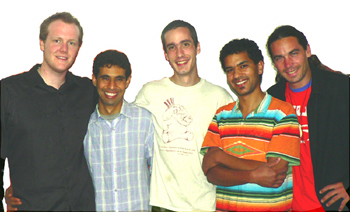![[Metroactive Music]](/music/gifs/music468.gif)
[ Music Index | Santa Cruz Week | SantaCruz Home | Archives ]
Amazigh Arising
Led by local musicians Fattah Abbou and Mohamed Aoualou, Santa Cruz will host one of the only Amazigh cultural festivals in the United States
By Peter Koht
Though most people are unaware of their presence, there are between 14 million and 25 million Amazigh people living in North Africa.
Indigenous to northwestern Africa, and genetically making up the majority of the population there, the Amazigh people, who most Westerners know as Berbers, have been marginalized since the Islamization of Morocco in the eighth century. Until the ascension of King Mohammed Ben Al-Hassan to the Moroccan throne in 1999, the political elite of the country ignored Amazigh cultural concerns.
In fact, using the Amazigh tongue, Tamazight, or script, Tifinagh, in education or in any official capacity was strictly outlawed, thus making 10 million Moroccans conduct their public business in their second language, Arabic.
According to anthropologist and Amazigh activist Helene Hagan, recent reforms have official sanction, but "the application of these measures is far from adequate. There is a great gulf between pontification and practice."
To draw attention to the plight of the Amazigh and to highlight the beauties of their culture, two local musicians, Fattah Abbou and Mohamed Aoualou. have organized the first annual Amazigh cultural festival. Supported by a grant from the Cultural Council of Santa Cruz, the event features a lecture by Helene Hagan, a dance workshop with the dancer Hassania and a traditional Moroccan tea service. Abbou and Aoualou will close out the evening with their band, Aza.
Aza has gone through some significant changes since the last time it took the stage at the Kuumbwa. Though Joel Ford still handles the horn duties, longtime guitarist and banjo player Jason Paquin has left for Arcadia. After serving long tenures in the rhythm section, neither bassist Andy Zenczak nor drummer Alex Work will be playing on the 23rd, as Max Bruce has taken over the kit and Pete Novembre now handles the bull fiddle. For this show, Tunisian percussionist and oud player Nabil Righi augments the sound of the rhythm section.
Though the group is still guided by the voices and strings of Mohamed and Fattah, this new musical unit is quickly coalescing; old songs have been rearranged and a surfeit of new material is ready to be hauled out onstage.
For most Westerners, the hardest things to master in North African music are the rhythms, which are populated by compound meters and asymmetrical accents. To help demystify these rhythms, at 1:30pm on the day of the festival Aoualou and Abbou will facilitate a drumming workshop. "The way we see it," says Abbou, "rhythm is circle. You can place accents wherever you want to. It has a structure, but it has to be felt more than played."
By learning a few of the standard rhythms that Aza will play later in the evening, participants will be able to more fully understand just what it is that makes this music so compelling to listen to. Besides, in Morocco, going to a show is a more participatory experience. According to Abbou, "When a concert happens in Morocco, it's not a one-sided thing. It is something for all of us to enjoy and participate in, both on the stage and in the audience."
If all goes as planned, this will be the first installation of what will become an annual festival. Like the Amazigh struggle for equality throughout Africa, there is much work to be done, but things are heading in the right direction.
Copyright © 2005 Metro Publishing Inc. Maintained by Boulevards New Media.
For more information about Santa Cruz, visit santacruz.com.
![]()

It's Amazigh: The Cultural Council of Santa Cruz is supporting the first Amazigh cultural fest at Kuumbwa on July 23.
The Amazigh cultural festival gets down July 23 at the Kuumbwa Jazz Center. Workshops ($5-$10) begin at 12:30pm, concert ($16-$18) at 8pm. Call 831.423.2048 or 831.425.2787 or visit www.azamusic.net.
From the July 13-20, 2005 issue of Metro Santa Cruz.